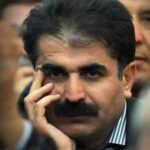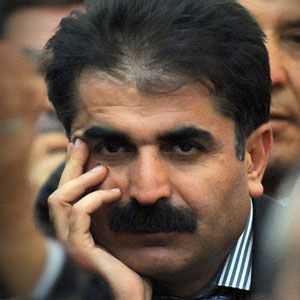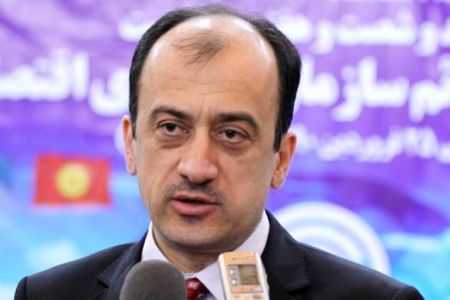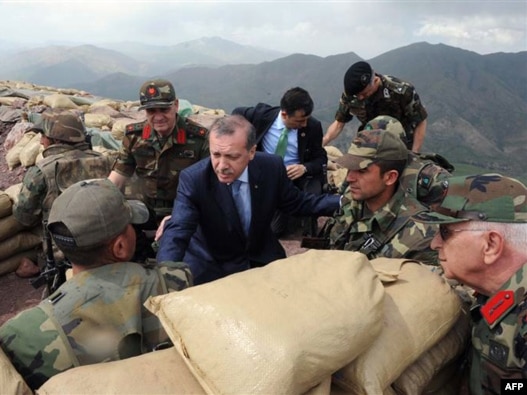
Turkish Prime Minister Tayyip Erdogan (center) talks with Turkish soldiers in a trench during his visit to the Turkish city of Hakkari on the border with Iraq on June 20.
June 24, 2010
With violence linked to Kurdish militants increasing in Turkey in recent weeks, the likelihood appears to be growing for a cross-border ground assault into northern Iraq by Turkish military forces. RFE/RL correspondent Ron Synovitz spoke with Michael Gunter — an authority on Kurdish affairs in Turkey, northern Iraq, Syria, and Iran — for a regional perspective on what is happening. Gunter, a political science professor at Tennessee Tech University and the International University in Vienna, has written nine books about the Kurdish people of the region — including some of the first analyses in English of Kurdish unrest in the Middle East.
RFE/RL: Violence in Turkey attributed to the outlawed Kurdistan Workers Party, the PKK, has been growing in recent weeks since the PKK ended the unilateral cease-fire that it declared last year. What is your overview of this situation in Turkey?
Gunter: In Turkey, it’s extremely disappointing because last fall the Kurdish opening of the Turkish government promised to go a long way to begin solving the Kurdish problem in Turkey and I have never seen the Kurds so optimistic as they were last fall. However, all this came tumbling down for a number of reasons.
Today we are back to square one. Turkey feels that the Kurds are trying to destroy Turkey. When I say the Kurds, I mean the PKK. There are many Kurds in Turkey that seem quite satisfied with the situation; whereas the PKK feels that the Turks have just not been sincere about any really genuine reform.
RFE/RL: Turkish military forces this week launched operations in southeastern Turkey against Kurdish militants. Turkish forces also have set up blocking positions in the mountains along the Turkey-Iraq border. What is your analysis on these military operations?
Gunter: Northern Iraq and the Qandil mountains near the Turkish border serves as a safe house for the PKK. In the last few weeks, the PKK has begun serious military action again in Turkey and the Turks feel it is coming from the Qandil mountains. That is partially true. But I think, too often, we don’t realize that there are PKK stationed in Turkey, too, and that even if the Qandil mountain safe house in northern Iraq were totally shut down, the PKK operations would continue from bases and safe houses within Turkey, too.
RFE/RL: Could you discuss some of key Kurdish factions in Turkey, northern Iraq, Iran, and Syria, and their interests? Is there unity among them or are they working toward separate goals?
Gunter: That would take an entire book and more. But in general, the Kurds throughout the region are in ferment. One of the main reasons is that the United States’ war against Iraq that began in 2003 opened up a Pandora’s box leading to the Kurdistan Regional Government, the KRG, in northern Iraq — which, in modern times, is arguably the first real Kurdish government in the world.
RFE/RL: What impact has the creation of the KRG in northern Iraq had on the Kurdish question across the region?
Gunter: The KRG not only has created a semi-independent state in northern Iraq, which attracts and inspires Kurds in Iran and in Turkey and in Syria; but the KRG has encouraged Kurds to strike out for their rights in these three other states. One problem the Kurds have always suffered from, though, is internal divisions, and these internal divisions among the Kurds are exacerbated by the fact that they live in different states, which has led the Kurds to have different interests. So I don’t see any particular coordination on the lines of a pan-Kurdish movement. Indeed, one traditional way the Kurds are controlled in the Middle East is “divide and rule.” The Turkish government right now is attempting to use the KRG in northern Iraq against the PKK that is stationed in Turkey.
RFE/RL: Masud Barzani, the president of the Kurdish regional government in northern Iraq, visited Ankara on June 2, where he met with Turkish Prime Minister Tayyip Erdogan and President Abdullah Gul to discuss what the Turkish government described as “security issues.” Do you think these talks will result in any overt cooperation between them, or perhaps a tacit understanding, on the issue of rising PKK violence in Turkey?
Gunter: It’s a very delicate situation. Both sides have very strong interests in cooperating with each other, but the KRG certainly has no interest in fighting against the PKK. Back in the early 1990s, Turkey was able to use the Iraqi Kurds to fight against the PKK — which caused an enormous amount of angst among the Kurds throughout the region and the world. So I don’t see any way that the KRG — Barzani — is going to fight against the PKK.
On the other hand, Barzani and the KRG have a tremendous vested interest in cooperating with Turkey because as the United States prepares to leave Iraq, Turkey is, in effect, going to be the great power guarantee of the KRG. The KRG must cooperate with Turkey economically and politically. And that goes for Turkey too. Turkey has a great deal of vested interest in economic and political cooperation with the KRG. Exactly how you compromise and meld these two very contradictory goals of Turkey and the KRG is beyond me. It creates constant problems between the two — how they are going to cooperate when they basically have different interests concerning the PKK.
RFE/RL: Some experts say it appears that there may be some kind of tacit “hot pursuit” agreement between the KRG and Anakara when it comes to cross-border incursions by Turkish forces to go after PKK militants in northern Iraq. What do you think?
Gunter: I basically agree. But that hot pursuit agreement is tacit. There’s nothing written down. But in effect, I think that is going on right now. The KRG criticizes Turkey, but what can the KRG do. In effect, the KRG realizes that it is going to have to let Turkey make these ground interventions. As far as Turkey goes, Turkey has been intervening in northern Iraq for the last 20 or 25 years. The fact that the situation continues shows that Turkey has made little if any progress in its interventions. So I think the Turkish interventions into Iraq are largely for domestic consumption and are certainly not going to root out the PKK problem which has been there for over 30 years.
RFE/RL: The rhetoric of Turkey’s Prime Minister Erdogan about Kurdish militants has been vitriolic — saying PKK fighters would “dry in their swamp and drown in their own blood.” Do you think this is a sign that Turkey may be preparing for another major ground offensive into northern Iraq like the kind last seen in February 2008?
Gunter: I think Prime Minister Erdogan of Turkey has opened up his reelection campaign and, by taking this belligerent attitude toward the PKK, is trying to get some legitimate looking nationalist credentials for the upcoming Turkish election. Yes, I think Turkey may well have a major intervention into northern Iraq. But I’m saying it won’t accomplish anything except rhetoric.
RFE/RL: Do you think there are similar tacit “hot pursuit” agreements between the KRG and Iran?
Gunter: Iran and Turkey mirror each other in their relations, off and on, with the KRG and the PKK. It’s Turkey that we hear the most about, but Iran has been fighting its own battle against a supposed PKK associate called the PJAK — the Freedom Life Party in northern Iraq, which has headquarters in the Qandil mountains. It is an Iranian-Kurdish party that periodically raids into Iran, and Iran shells the border and raids back into northern Iraq. So there is an overall firmament involving both Turkey and Iran.
RFE/RL: What about Baghdad’s apparent benign tolerance of Turkish incursions into northern Iraq? Do you think Baghdad has an any agreements with Ankara to turn a blind eye toward Turkish forces that go after PKK militants in northern Iraq?
Gunter: Probably even more so. Baghdad has its own serious domestic problems — headed by the fact that Baghdad doesn’t even have a government right now and therefore is in a very poor position to oppose Turkish and Iranian interventions. However, on a theoretical basis, of course, Baghdad is the ultimate sovereign authority in northern Iraq. So Turkey and Iran are going to have to, at least in theory, deal with the Baghdad government. Actually, this situation gives a little leeway because when the KRG does cooperate with Turkey, it can say, “Well, we’re not really cooperating with Turkey because we’re not the sovereign here. Baghdad is the sovereign.” “It’s Baghdad’s fault for cooperating with Turkey and letting Turkish troops into northern Iraq to chase the PKK.” So the situation with Baghdad can be played both ways by both sides and further complicates the situation.
RFE/RL: Do you think Baghdad and Iran have tacit “hot pursuit” agreements when it comes to dealing with Kurdish militants like the PJAK in northern Iraq?
Gunter: I certainly think there are tacit agreements here. And, of course, we don’t know ultimately the relationship between the Iraqi Shi’ite parties and Iran. I suspect that the most important accomplishment in overthrowing Saddam [Hussein’s regime] was to hand Iraq to Iran. Sometimes we see signs of that and sometimes we see signs that the Iraqi Shi’ites remain very Iraqi nationalistic. But certainly Baghdad has been in no position to oppose Iranian or Turkish interventions into northern Iraq. Even if Baghdad were, I think there would be tacit understandings that Iran and Turkey have a right to go after what they see as terrorist movements.
https://www.rferl.org/a/Kurdish_Expert_Regional_Perspective_Violence_Turkey/2081625.html





 Turkish Prime Minister Tayyip Erdogan (center) talks with Turkish soldiers in a trench during his visit to the Turkish city of Hakkari on the border with Iraq on June 20.
Turkish Prime Minister Tayyip Erdogan (center) talks with Turkish soldiers in a trench during his visit to the Turkish city of Hakkari on the border with Iraq on June 20.
